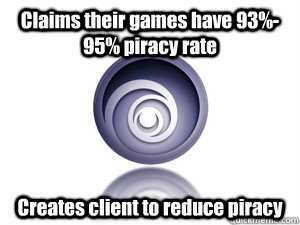Step 2: Evolving Toward New Business Models
 As mentioned before, a different business model in which availability and
distribution are increased has been shown to decrease piracy. Two major factors
that limit availability and encourage international piracy of digital goods are
Geo-Restriction and Geo-Pricing. In many countries in Europe and Asia which are our largest markets, consumers may have
restricted or removed features in their digital products or simply no access to
even purchase them physically or digitally, this is called Geo-Restriction
(More). Foreign consumers also usually pay more for the same or likely
restricted version of the product that we buy. For instance, a game that costs
$59.99 for us would cost €59.99 Euros for EU consumers, even though
their currency has a higher value ($78.70), this is called Geo-Pricing. The
majority of digital goods are distributed online and therefore shipping and
logistic costs is not a problem or excuse. Geo-Restriction sometimes leave
international consumers no choice but to pirate in order to access content, and
Geo-Pricing leave consumers feeling hustled. It's not so ironic why Internet
Piracy is so prevalent and going strong in Europe and Asia.
As mentioned before, a different business model in which availability and
distribution are increased has been shown to decrease piracy. Two major factors
that limit availability and encourage international piracy of digital goods are
Geo-Restriction and Geo-Pricing. In many countries in Europe and Asia which are our largest markets, consumers may have
restricted or removed features in their digital products or simply no access to
even purchase them physically or digitally, this is called Geo-Restriction
(More). Foreign consumers also usually pay more for the same or likely
restricted version of the product that we buy. For instance, a game that costs
$59.99 for us would cost €59.99 Euros for EU consumers, even though
their currency has a higher value ($78.70), this is called Geo-Pricing. The
majority of digital goods are distributed online and therefore shipping and
logistic costs is not a problem or excuse. Geo-Restriction sometimes leave
international consumers no choice but to pirate in order to access content, and
Geo-Pricing leave consumers feeling hustled. It's not so ironic why Internet
Piracy is so prevalent and going strong in Europe and Asia.
Geo-Restriction and Geo-Pricing
exist because of tax regulation laws but more importantly, because it's an old business model that attempts
to extract the most profit it possibly can from consumers. The solution
is to repeal and fix this unnecessary practice. Distribution services such as
Valve's Steam, Netflix and iTunes have done this, resulting in significantly
reduced piracy in their respective industries, while greatly expanding and
making billions. Their success is attributed to convenient universal access to
content, fast/reliable service and affordable relative pricing to all,
including international consumers.
To reemphasize the impact of this new business model that increases global availability of digital products, using reliable online distribution channels without Geo-Restriction and Geo-Pricing, Video Game Piracy accounts for 6.7% in 2011of all pirated goods which is significantly down from 10.4% in 2008, and still on the decline. This is attributed to services like Steam.
To reemphasize the impact of this new business model that increases global availability of digital products, using reliable online distribution channels without Geo-Restriction and Geo-Pricing, Video Game Piracy accounts for 6.7% in 2011of all pirated goods which is significantly down from 10.4% in 2008, and still on the decline. This is attributed to services like Steam.
The new business models that have
been described have been implemented and worked in successfully reducing piracy
by better appealing to consumers and constructively listening to their market
demand, and thus gaining their loyalty. New business models always concern
industry leaders because of risk and the possibility of not being able turning
back, but the inception of the internet has leveled the playing field.
I'm not saying that companies directly copy/adopt iTunes, Steam, and Netflix's business methods, but the Industry should model their attitude and approach to these companies', in that developing innovative methods and new effective business models to significantly reduce piracy is the solution, and definitely more worthy than not changing and lobbying for draconian policies.
<<<Back Next>>>
I'm not saying that companies directly copy/adopt iTunes, Steam, and Netflix's business methods, but the Industry should model their attitude and approach to these companies', in that developing innovative methods and new effective business models to significantly reduce piracy is the solution, and definitely more worthy than not changing and lobbying for draconian policies.
Ubisoft Has the Right Attitude
<<<Back Next>>>












1 comments:
Great info! I recently came across your blog and have been reading along. I thought I would leave my first comment. I don’t know what to say except that I have.Human Resource Management Scheme
Post a Comment